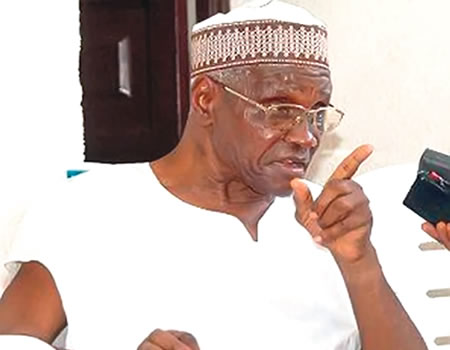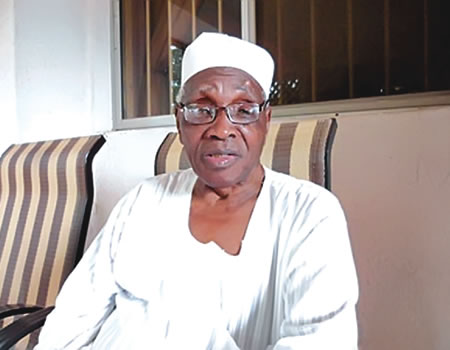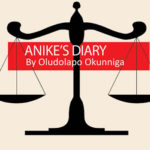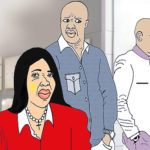Nigeria is battling with insecurity, the latest case being the reported killing of about 100 soldiers at the Metele Camp in Borno State, allegedly by members of Boko Haram. What is your view on this recurring problem?
Yes, we read in the newspapers of the killing of a number of military personnel. I am concerned about the loss of lives in any circumstance. But we have been living with this situation for almost 10 years now – since the problem started in the North East. This is something that has gone on since the Boko Haram insurgency started. We have had quite a number of discussions on ways out of this problem since the administration of former President Goodluck Jonathan. I remember that we presented a document to him through our late leader, Alhaji Maitama Sule. It was a fairly comprehensive document that was presented to the former president. We had a number of recommendations.
The main issue raised is that, yes, military option is important, no doubt, because the Boko Haram militants are using force, killing people. So, there is no doubt that the Nigerian state must be well prepared to do the same. But we did ask a question: ‘Is the military option always the last solution or the only solution available?’ And the answer is obviously no, particularly if you look at inferences around the world where countries are fighting this kind of insurgency. We argued that we could not bring to end insurgency if the community where the insurgents are based is not part of the solution. We argued that there was no way Boko Haram would continue to have recruits without the consent of the environment in which they operate. So, was it not possible for the government at that time, even now, to look at this area very carefully to see how it can truncate the methods the Boko Haram leaders are using to recruit young people into their operations? As long as this is there, I don’t think we can say the end can come. The end can only come when you cut off supply of materials into these operations and the main material into the operations is human material. This human material must be from the society in which this thing is happening.
So, we asked the question: ‘Is the government doing enough to ensure that it is actually getting its operations linked with the aspirations and concerns of the society in which this thing is happening?’ At that time, we argued that they would not succeed as long as the society in which they [Boko Haram terrorists] operate regards the army as an occupation force. That time, it was very difficult for one, for example, to move from Bauchi to Maiduguri. It could take you a day or two going through checkpoints. There was a lot of harassment. So, you are not sure whether the society itself is friendly enough with the military, in the sense that the society should serve as a source of information. Intelligence is absolutely important in this kind of operation because you need a lot of information that would make it possible for you to act proactively.
Can you say that your recommendations worked then?
Obviously, at that time, there was a failure in the military approach because you must integrate the people. In later years, we realised that the society was being brought in and civilians were participating, either independently or with the military, to fight the insurgency. Initially, there was an indication of success in the operation, particularly at the beginning of the present administration. But it looks like the success is actually not being sustained because there is rising insurgency with coordinated attacks being carried out, this time not against the civilian population but military formations.
This one is a bit tricky. My thinking about this is that as long as we have not been able to occupy the areas where these operations are going on and the civil population is, to a large extent, unfriendly, the military will continue to be isolated as targets by these people. This is because what we have now, for example, from what one reads from the newspapers because I have visited the areas physically, but from the population of these internally displaced persons (IDPs), there is a huge concentration of people, which suggests that people are moving away from their normal habitats to these refugee camps and so the land there is actually free of civil population. As long as the land is not occupied, to the extent that the insurgents are able to distinguish between civil the population and military formations, it makes the military formations more visible and easier to attack.
So, the serious challenge is to see whether these people that have been internally displaced can go back home and resume normal life. If they can resume normal life, it would become easy for the military to use this population in terms of intelligence gathering and persuading families to dissuade their children from joining the insurgents. But as it is now, the IDP can even be intelligence base for the Boko Haram where they can come to collect information on what is happening generally in the country and then go on to plan their attacks. So, it is not an easy matter at all.
You earlier talked about a document which you submitted to former President Jonathan, which he did not implement…
Well, part of what we recommended at that time was accepted. For example, it was our recommendation at that time that the government should engage the Boko Haram leadership in dialogue. I think that was when President Jonathan set up the dialogue committee, led by one of his ministers. You will also remember that there was a disagreement that the government was not keeping this approach quiet to the extent that the people that volunteered to be part of the dialogue on the part of the Nigerian state, maybe, for their own safety, refused to participate. The arrangement eventually failed.
There were also those who felt that the Nigerian government should not, in any way, be found to be engaged in the dialogue with those considered to be terrorists. But they should have learnt from other countries. The United States government found itself with no option but to sit down with terrorists in various countries where it operated, including Afghanistan. So, I think it would not be wise to abandon this approach as countries usually develop sophisticated ways of reaching out to some of these insurgent leaders.
Even here in Nigeria, we understand that these insurgents have split into about four groups and that is the reason they can also disagree and an advantage of that can be taken. So, I quite honestly don’t know what the government approach is now, whether it is a total military approach. And if it is totally military, I don’t think it would work. The other thing to look at is the origin of the Boo Haram insurgency itself. According to many studies that I have read, it started because of socio-economic problems. Socio-economic problems drive people into crimes and some of these crimes are sometimes organised and a point may be reached where some of these socio-economic forces really force these groups into organisations. I think this is the major area now because I believe that a lot of the security problems we have in Nigeria now are related to socio-economic issues.
Another thing we mentioned in our report at that time was that given two, three, four years of large-scale military operations and displacement of people from their normal lives and so on, it was like post-Second World War. What was called a marshal plan was organised for the recovery of war-devastated parts of Europe and this is what is required, even in Nigeria today, that some of these areas require sustainable socio-economic plans that would rehabilitate the people. Without this, the Boko Haram would continue to get recruits, particularly if robbery, or whatever, would make some people get money.
I want to believe that what you are saying now is part of the recommendations you made in the document submitted to former President Jonathan…
It was a fairly comprehensive document that we gave the president.
Did you submit the same document to the present administration and how far it has gone in implementing the recommendations contained therein?
We have not done anything as formal as we did during the last administration, because what we expected, since part of our recommendations was looked into to the point of setting up this dialogue committee – even though it was abandoned – is that government is a continuum. One would expect that part of the continuity would be to look at all portions that, at various times, Nigerians have been able to make inputs into, ideas that the government should use in tackling some of these challenges. Our report should have been a document that, perhaps, people should have used or this government or succeeding government should use to tackle this challenge. I think there is no doubt that some successes have been achieved, but with the increasing insurgency, you cannot win this war, which is not a conventional war. A conventional warfare is where your main requirement is command and equipment. But this is a guerilla warfare which cannot be won by a conventional approach.
The President Muhammadu Buhari-led administration, which is now more than three and a half years old, had promised to tackle insecurity within its first year. How would you rate the administration in the light of the persistent problem?
The president indeed promised to tackle the problem of security. What I will say, as I have said in quite a number of interviews, is that one could give the administration credit for the successes it recorded in degrading the potency of the Boko Haram insurgency in the beginning. But I think the administration has also fallen into the thinking that the whole approach must be done militarily. But our report shows very clearly that a total military solution would not succeed in the long run. Guerilla warfare cannot be won through a total military operation as we have seen around the world. So, I think that if the initial successes they recorded using purely military approach is now giving way to resurgence of militancy, there is the need to reappraise it and see whether there is the need to change the approach or the tactics or if there is the need to mix the military approach with other means to see whether things can be better. But certainly, there is a rise in militancy in the area, no matter how much people say otherwise.
You said some Boko Haram members are likely indigenes of most of the communities under attacks but… (cuts in)
Absolutely, yes. I can say about 80 to 90 per cent of the militants are from the socio-economic formations of the regions, here in Nigeria and some other neighbourhoods…
But President Buhari was recently reported to have said that members of the insurgent group are mostly from neighbouring countries. How would you reconcile your assertion with what the president reportedly said?
I don’t agree with that concept at all. A number of arrests that have been made in the last few years had included Nigerians, in fact, not just Nigerians within the immediate environment of the various attacks, but also communities that are right within the country. So, we have to look at the ideological content of the Boko Haram operations. We had thought initially that the whole problem was socio-economic, but when we looked at it in details, it was discovered that, particularly now, Boko Haram is linked up with some other groups in other African countries in the Maghreb area, including Al-Shabbab and some other groups that you can find in Libya and some other places. So, there is no doubt that there are some other links and these links would themselves link to the ideological content that, perhaps, Boko Haram does not have.
How would you relate this security problem to the 2019 elections?
We cannot be sure of anything except what we can be assured of by the government. Even in the elections of 2015, the former president was certainly very concerned about having an environment where the elections could hold. I think the then government took extra measures to make sure that elections were held to some extent, even in the so-called war zone areas. So, this time, maybe the government would seek further assurances in areas that seem to be prone to insurgency and take some measures, including seeking assistance from neighbouring countries and other international communities to ensure that those places were kept peaceful as much as possible for the 2019 elections to also take place there.
WATCH TOP VIDEOS FROM NIGERIAN TRIBUNE TV
- Relationship Hangout: Public vs Private Proposals – Which Truly Wins in Love?
- “No” Is a Complete Sentence: Why You Should Stop Feeling Guilty
- Relationship Hangout: Friendship Talk 2025 – How to Be a Good Friend & Big Questions on Friendship
- Police Overpower Armed Robbers in Ibadan After Fierce Struggle







